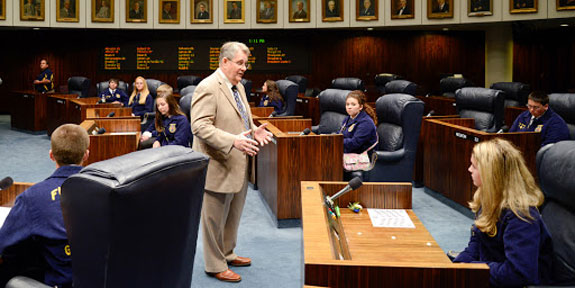
Senate President Don Gaetz, who was an original proponent of ethics reform, supports having safeguards in place that will prevent elected officials from hiding financial interests and conflicts from the public. (Photo courtesy of the Florida Legislature.)
By Ashley Lopez
Florida Center for Investigative Reporting
An ethics law expert says a provision in the Florida Senate’s ethics reform bill would allow a state lawmaker to shield conflicts of interest from public disclosure.
Leaders in the Republican-led Florida Legislature have said this session would be one of sweeping ethics reform. But there have been a few bumps in the road. Mainly, ethics reform groups have voiced concern that the proposed bills in the House and Senate are too weak.
The Miami Herald reported this week that the former director of the Florida Ethics Commission, Phil Claypool, is concerned about a provision in the Senate bill that would allow lawmakers to shield from public disclosure potential conflicts of interest and financial assets.
Under SB 2, which passed the Senate on the first day of the legislative session, any public official who wants to avoid disclosing embarrassing financial information on their financial disclosure forms could create a blind trust to hold their assets.
“This really would be a wolf in sheep’s clothing,’’ said [Claypool]. “The whole idea is to protect both the public official and the public from conflicts of interest” but under the Senate bill “you’ve just got room for all kinds of mischief.’’
The Senate bill — for the first time in Florida — provides for “blind trusts” for elected officials and was promoted as a way to help public officials “avoid potential conflicts of interest” by allowing them to hand off responsibility for investing their assets to a trustee. The idea is that an elected official would be “blind” to what he owned because the trustee would be banned from disclosing how the assets are invested.
The measure is part of a larger ethics reform package that includes new laws that would force public officials to disclose conflicts and face new restrictions on who they can work for while in office or when they retire from office. But Claypool believes that the Senate bill essentially “stands the concept of a ‘blind trust’ on its head’’ by creating a “cloak of invisibility” in which elected officials simply “pay a lawyer to draw up a trust” and hide behind it.
Right now, the House version of the bill has the same provision, but includes safeguards for the public, which Claypool is recommending to lawmakers. Senate President Don Gaetz, who was an original proponent of ethics reform, supports having those safeguards in place.
However, ethics advocates are also still weary of a provision in both bills that that allows elected officials to fix their financial disclosure forms up to two months after submission and up to one month after any complaint is filed.
Outgoing Lt. Gov. Jennifer Carroll amended her own financial disclosure this week. She resigned from her state position because of an investigation into her involvement with Allied Veterans, which federal officials described as running a $300 million scam.
According to the Tampa Bay Times, Carroll “filed an amended financial disclosure form for 2010 specifying that she was paid $16,047 that year by a controversial veterans’ group that led to her resignation last month.”
Ethics reform advocates believe that this allows lawmakers to choose when to release information to the public and that the public should be able to review in real time elected officials’ financial interests.
